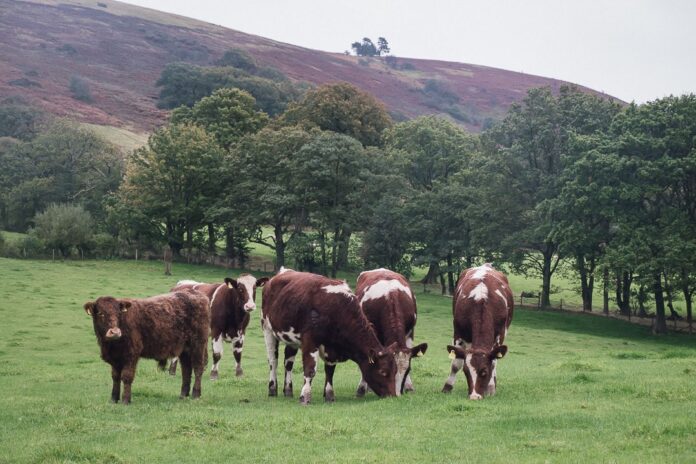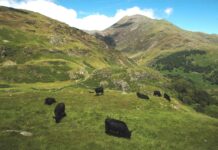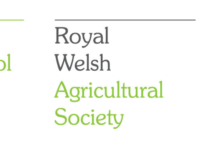- Evidence shows Welsh farms can increase financial resilience by an average of 42% through nature-friendly farming practices which balance food production with the natural environment
- Nature Friendly Farming Network Cymru calls for long-term funding, ambitious change in policy and sufficient reward for Welsh farmers to transition to sustainable farming methods which restore ecosystem health and mitigate climate change
Evidence from over 50 farms in the UK, including 10 in Wales, shows a farm approach that can simultaneously restore nature, cut input costs and boost profit margins.
A new report by the Nature Friendly Farming Network Cymru (NFFN) presents evidence of an average increase in farm profitability of 42% when farms actively work with the natural environment to manage production sustainably.
Previous farming subsidies under the EU Common Agricultural Policy, designed to increase productivity after the Second World War, have largely contributed to farm inefficiencies, biodiversity loss, soil erosion and land degradation.
The rising costs of environmental damage, such as declining soil health, are absorbed by farm businesses resulting in dependency on expensive artificial inputs to substitute the landscape’s natural fertility. After the war in Ukraine pushed up prices and disrupted supply, rising chemical fertiliser prices added an estimated £160 million to farming’s bottom line.
The report argues that increasing inputs doesn’t guarantee higher rates of profit if the natural environment is damaged or pushed beyond its natural capacity. In 2020-21, the average farm income in Wales was £34,300 – the lowest in the UK – two-thirds of which came from public money. In Wales, feed costs are the largest contributor to farm expenses, accounting for 35% of all inputs, followed by pesticides, fuel and artificial fertilisers.
The research highlights a framework, coined the Maximum Sustainable Output (MSO), that reduces input reliance by adopting a range of regenerative farming techniques to enhance soil health and restore biodiversity. Taken together, these measures represent a potentially significant reduction in input costs for farmers with beneficial returns for the environment.
The new Nature Means Business report comes weeks before the Welsh Government’s Stage 3 debate of the Agriculture Bill, which aims to support the resilience of agricultural businesses by encouraging environmentally sustainable food production.
NFFN Cymru remains supportive of the Bill but cautions that it must go to great lengths to address the climate and nature crises by moving at pace to phase out the Common Agriculture Policy and replace it with policies that encourage and reward nature-friendly practices.
The report concludes that farm businesses obtain maximum returns by moving away from a high-productivity farming system to a balance of farming with natural assets and careful countryside management.
Hywel Morgan, NFFN Cymru Chair, and farmer at the Bannau
Brycheiniog National Park:
“Many farmers know that healthy soils and a thriving natural environment are good for business; they help create resilient, reliable and productive farms. The value of nature in farm profitability cannot be overlooked. But we need the Welsh Government to uphold this vision for agriculture in the upcoming Agriculture Bill and Sustainable Farming Scheme, so we make this way of farming the norm.”
Sam Kenyon, NFFN Cymru Vice Chair, and farmer in Denbighshire said:
“Nature-friendly farming takes a holistic view of how we can regenerate the landscapes we rely on for food production. This report shows how farming with nature can improve financial resilience and strengthen the foundations of a sustainable farm business.”
NFFN Cymru Sustainable Farming Lead, Rhys Evans, said:
“The Agriculture Bill is the last chance we have in Wales to create a framework for supporting farmers in tackling the biggest challenges our nation faces. The nature and climate emergencies are at a point where merely protecting our existing resources is not enough – we must take action to actively enhance our environment. Regenerative farming aims to do this, beginning by improving our soils. We need fair rewards and incentives for the whole of the sector to transition to nature=friendly farming practices that restore and protect our natural environment while sustainably producing high-quality food.”
Huw Foulkes, farmer at Pentrefelin, Llandyrnog, Denbigh, said:
“We need farmers who produce nutrient-dense, healthy, nature-friendly food to be rewarded for their work. It doesn’t make sense that 90% of the area in Wales is farmland, yet some parts of Wales are amongst the poorest in Europe, and people can’t afford to eat. The current food system does not work for farmers or the people in our country: it’s not a secure food system and is one that’s heavily reliant on factors that we can’t control.”
Help keep news FREE for our readers
Supporting your local community newspaper/online news outlet is crucial now more than ever. If you believe in independent journalism, then consider making a valuable contribution by making a one-time or monthly donation. We operate in rural areas where providing unbiased news can be challenging. Read More About Supporting The West Wales Chronicle


























